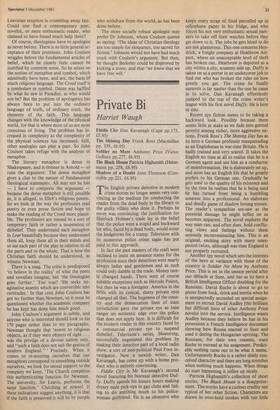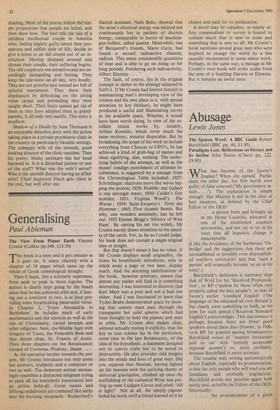Private Bi
Harriet Waugh
Fiddle City Dan Kavanagh (Cape pp.173, £5.95) The Shining Day Frank Ross (Macmillan pp. 339, £6.95) Soldier no More Anthony Price (Victor Gollanz pp.277, £6.95) The Black House Patricia Highsmith (Heinemann pp. 258, £6.95) Shadow of a Doubt June Thomson (Constable pp.22I, £6.95) The English private detective in modern crime stories no longer seems very convincing as the medium for conducting the reader from the dead body in the library to the guilty villain who done it. Perhaps he never was convincing: the justification for Sherlock Holmes's trade lay in the belief that the police were a stupid and backward lot who, faced by a dead body, would scour the hedgerows for a tramp. Television with its numerous police crime sagas has put paid to this approach.
In fact the past masters of the craft were inclined to insist on amateur status for the profession since their detectives were nearly always ladies and gentlemen and as such could only dabble in the trade. Money rarely changed hands. There were of course notable exceptions such as Hercule Poirot, but then he was a foreigner. America in the 1950s with its cynical, sleezy private eyes changed all that. The hugeness of the country and the demarcation lines of state jurisdiction gave the private eye as lone ranger an authentic edge over the police that does not apply here. It is difficult for the modern reader in this country faced by a commercial private eye to suspend disbelief. Television's series, Shoestring, successfully negotiated this problem by making their detective part of a local radio show: a sort of non-political Paul Foot investigator. Now a newish writer, Dan Kavanagh, has come up with a home product who is entirely convincing.
Fiddle City is Mr Kavanagh's second novel featuring his bisexual detective Duffy. Duffy spends his leisure hours making dreary male pick-ups in gay clubs and failing to do anything much to his policewoman girlfriend. He is an obsessive who keeps every scrap of food parcelled up in cellophane paper in his fridge, and who forces his not very enthusiastic sexual partners to take off their watches before they get down to it. The jobs he gets hired to do are not glamorous. This one concerns Hendrick, a freight company at Heathrow Airport, where an unacceptable level of theft has broken out. Heathrow is depicted as a city within a city, scummy side up. Duffy is taken on as a porter in an undercover job to find out who has broken the rules on how greedy you get. The crime he finally unravels is far nastier than the one he came in to solve. Dan Kavanagh effortlessly jumped to the top of the crime writer's league with his first novel Duffy. He is here to stay.
Recent spy fiction seems to be taking a backward look. Possibly because there seems little at stake as we fade into genteel poverty among richer, more aggressive nations. Frank Ross's The Shining Day has as its hero a German professor masquerading as an Englishman in war-time Britain. He is badly trained and very scared. It takes the English no time at all to realise that he is a German agent and use him as a conductor of misinformation. He is elaborately set up, and soon has an English life that he greatly prefers to his German one. Gradually he gets used to the quality of his existence and by the time he realises that he is being used he has turned from being a bumbling amateur into a professional. An elaborate and deadly game of shadow boxing ensues. The reader's sympathies see-saw as the potential damage he might inflict on us becomes apparent. The novel explores the way man can, and often does, hold conflicting views and feelings without them seriously inconveniencing him. This is an original, exciting story with many unexpected twists, although war-time England is not properly recreated.
Another spy novel which sets the interests of the hero at variance with those of the country is Soldier No More by Anthony Price. This is set in the uneasy period after our debacle at Suez, and has as its hero a British Intelligence Officer doubling for the Russians. David Roche is about to go to pieces from funk, drink and inertia when he is unexpectedly seconded on special assignment to recruit David Audley (the brilliant but difficult hero of other Anthony Price novels) into the service. Intelligence wants Audley because they believe he has in his possession a French Intelligence document showing how Russia reacted to Suez and used it during the Hungarian uprising. The Russians, for their own reasons, want Roche to succeed at his assignment. Predictably nothing turns out to be what it seems. Unfortunately Roche is a rather dimly conceived character and there are long stretches when nothing much happens. When things do start happening it jollies up nicely.
Patricia Highsmith's collection of short stories, The Black House is a disappointment. The stories have a curious crudity not typical of her other fiction. Characters are drawn in over-bold strokes with too little shading. Most of the stories follow the simple proposition that people are lethal, and then show how. The best tells the tale of a childless intellectual couple in America who, feeling slightly guilty about their prosperous and selfish style of life, decide to give a home to an old couple out of an institution. Having shopped around and chosen their couple, their suffering begins. The old couple are not attractive and are exceedingly demanding and boring. They keep the television on all day, very loudly. They are not grateful and instead are full of spiteful resentment. They show their displeasure by defecating on the sitting room carpet and pretending they were caught short. Their hosts cannot get rid of them as they have adopted them as grandparents. It all ends very nastily. This story is excellent.
Shadow of a Doubt by June Thomson is an enjoyable detective story with the action taking place in a private psychiatric clinic in the country (a particularly likeable setting). The unhappy wife of the smooth, good looking director of the clinic vanishes. Then his pretty, bitchy secretary has her head battered in. Is it a disturbed patient or one of the staff'? What was the wife's secret? Who is the smooth director having an affair with? Chief Inspector Finch gets there in the end, but well after me.











































 Previous page
Previous page